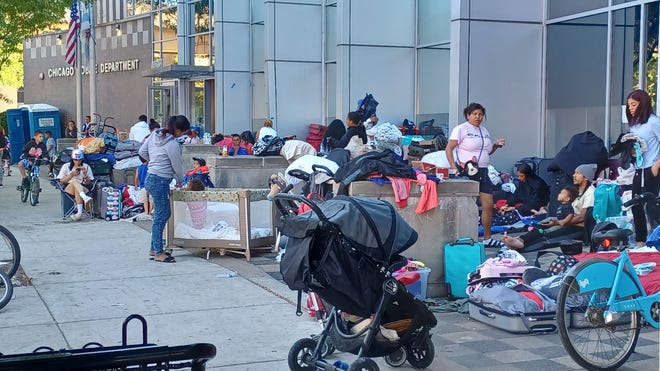CHICAGO – Though her lakefront condo is 1,500 miles from the U.S.-Mexico border, Dora Lewis said she’s reminded every day of what she calls the “failed Biden-Harris border policy.”
Her windows look out on a hotel-turned-migrant shelter. Middle class Black Americans like her, she said, worked hard to afford a home along Chicago’s desirable lakefront area, but migrants are “not paying anything, literally not anything.”
Even as Vice President Kamala Harris makes history this week at the Democratic National Convention as the first Black Asian American presidential nominee, Lewis said she’s not swayed. Former President Donald Trump has her vote.
“The only reason I will vote for Trump is because I believe he will do something about immigration,” said the 80-year-old retired teacher.
Lewis knows supporting Trump makes her an anomaly. Polls show most Black voters enthusiastically support Harris, and Chicago is one of the bluest cities in one of the bluest states in the nation.
Sign-up for Your Vote: Text with the USA TODAY elections team.
Losing Lewis’ vote in Illinois likely won’t matter to Harris’ run for president, but the concerns she raises underscore a challenge facing Democrats who will need to turn out large numbers of Black voters in swing states like Pennsylvania, Michigan, Georgia and Wisconsin for a shot at winning this November.
Outside the convention doors, posters of Harris mirrored the iconic image of former President Barack Obama’s iconic “Hope” poster in his 2008 presidential campaign. The Harris edition, called “Forward,” were made “purely in pursuit of a better future,” its artist, Shepard Fairey, has said.

But even Democratic leaders in Chicago who support Harris say the concerns of Black residents like Lewis are real.
Anthony Beale, an alderman from the predominantly Black 9th ward in the city’s far south side, said he has constituents who have waited years for public housing vouchers while migrants who have only recently arrived in the U.S. are receiving six months’ housing assistance.
“It’s like a slap in the face,” he said. “People in the community are extremely frustrated, taken advantage of and taken for granted.”
:Stepping up vaccinations:Chicago moves to vaccinate people amid migrant shelter measles outbreak

Migrants get housing while Black Chicago remains “on life support”
Border security had been one of the Biden-Harris administration’s toughest challenges – until the number of new migrants began declining sharply this summer.
The COVID-19 pandemic upended economies around the world and stifled travel. Once the pandemic waned, migrants began heading in massive numbers to the U.S. border to seek asylum or other immigration opportunities. There were record migrant encounters and apprehensions at the U.S.-Mexico border each of the past three years.
Chicago felt it, too.
When Texas Gov. Greg Abbott began busing migrants to “sanctuary cities” around the country – led by Democratic mayors – he included the Windy City. The three-term Republican governor’s Operation Lone Star has transported nearly 37,000 migrants to Chicago since August 2022, the No. 2 destination after New York City.

Since then, Chicago has spent more than $460 million, according to a dashboard of expenditures related to its “New Arrivals Program” for migrants. Eligible migrants receive up to six months of rental assistance and public transportation cards.
“There’s no money to build our communities up, but we watch others get built up,” said Zoe Leigh, 38-year-old LGBTQ woman activist who lives in the Bronzeville neighborhood, historically known as the city’s “Black Metropolis.”
“The Section 8 waiting list (is so long) that kids are now 16 and 17 years old but they were children when (the families applied),” she said. “They’ve still not received a voucher.”
More than 200,000 families are on the Chicago Housing Authority’s waiting lists, according to its fiscal year 2023 report. The wait for public housing is six months to 25 years, CHA says, depending on the specific development and unit size needed.
Beale was one of 18 aldermen who voted against a measure in April to provide an additional $70 million in city funds on top of the $150 million already earmarked for migrant programs in the city’s 2024 budget. The measure passed with 30 votes, but even some who voted yes had doubts.
“This investment felt like a strong-arm robbery when you consider the meager investments Black leaders have asked for and been denied,” 5th ward Alderman Desmon Yancy wrote in an op-ed in the Chicago Sun-Tmes last spring.
He said he approved the funding because his ward includes a hotel-turned-migrant shelter along South DuSable Lake Shore Drive but warned, “Black Chicago is on life support.”
National problem, personal pain
Immigration creates benefits in terms of national economic growth, but it also creates significant costs at the individual level, said Steven Camarota, director of research for the right-leaning Center for Immigration Studies.
“African American residents of Chicago are seeing some of those costs whether in the form of job competition or competition for public resources,” he said.
Chris Towler, associate professor at California State University-Sacramento, said the frustration expressed by some Black Chicagoans doesn’t reflect Black voters nationally.
Towler, who is also director and principal investigator of the Black Voter Project, said 53% of Black voters reported that immigration is positive for the country, according to a recent poll. Yet there are signs of weakness for Harris on the issue: When asked about Biden-Harris handling of immigration, approval dropped to 40%.
“I can absolutely see their perspective,” Towler said of the disenchanted Chicago voters. “It is real to them and fits the narrative of their lives day in and day out.”
William Hall, an alderman of another predominantly Black ward on the southwest side who voted for the additional funding to aid migrants, said the anger over the migrant issue is misplaced.
“It was a federal emergency, and there’s no perfect way to handle an emergency,” he said. “We had people all through the streets sleeping where they could.”
What was given to the migrants was “in actuality, no real advantage,” Hall said. It was a “place to rest their heads and get three meals a day … the quality is basically a cot, a bathroom. Now, we see at end of day, it ain’t what we thought it was and some migrants have even left Chicago.”

Disenchanted voters
Chicago will go to Harris, whether disenchanted Black voters stay home or vote for Trump.
Beale, the alderman, expects to “see a drop off (of Black support) based on policies and how they affect the Black community.”
“I’m trying every single day to get them to vote Democratic, but it’s hard to tell people to vote one way and rally behind the party with these policies,” he said.
Some, including Lewis and Leigh, are cemented in their views.
“Trump isn’t lying when he says they’re taking away Black jobs,” Lewis said. “Maybe he didn’t say it right, but we know what he means.”
In a recent USA TODAY/Suffolk University poll, 72% of Black likely voters in Michigan said they found Trump’s comment offensive and 67% of those in Pennsylvania did.
Still, Leigh said she plans to stay home or cast a vote for Trump on Election Day.
“I’m done,” said Leigh, the LGBTQ activist. “Where is the Black agenda?”
Medora Lee is a money, markets, and personal finance reporter at USA TODAY. You can reach her at mjlee@usatoday.com and subscribe to our free Daily Money newsletter for personal finance tips and business news every Monday through Friday morning.



